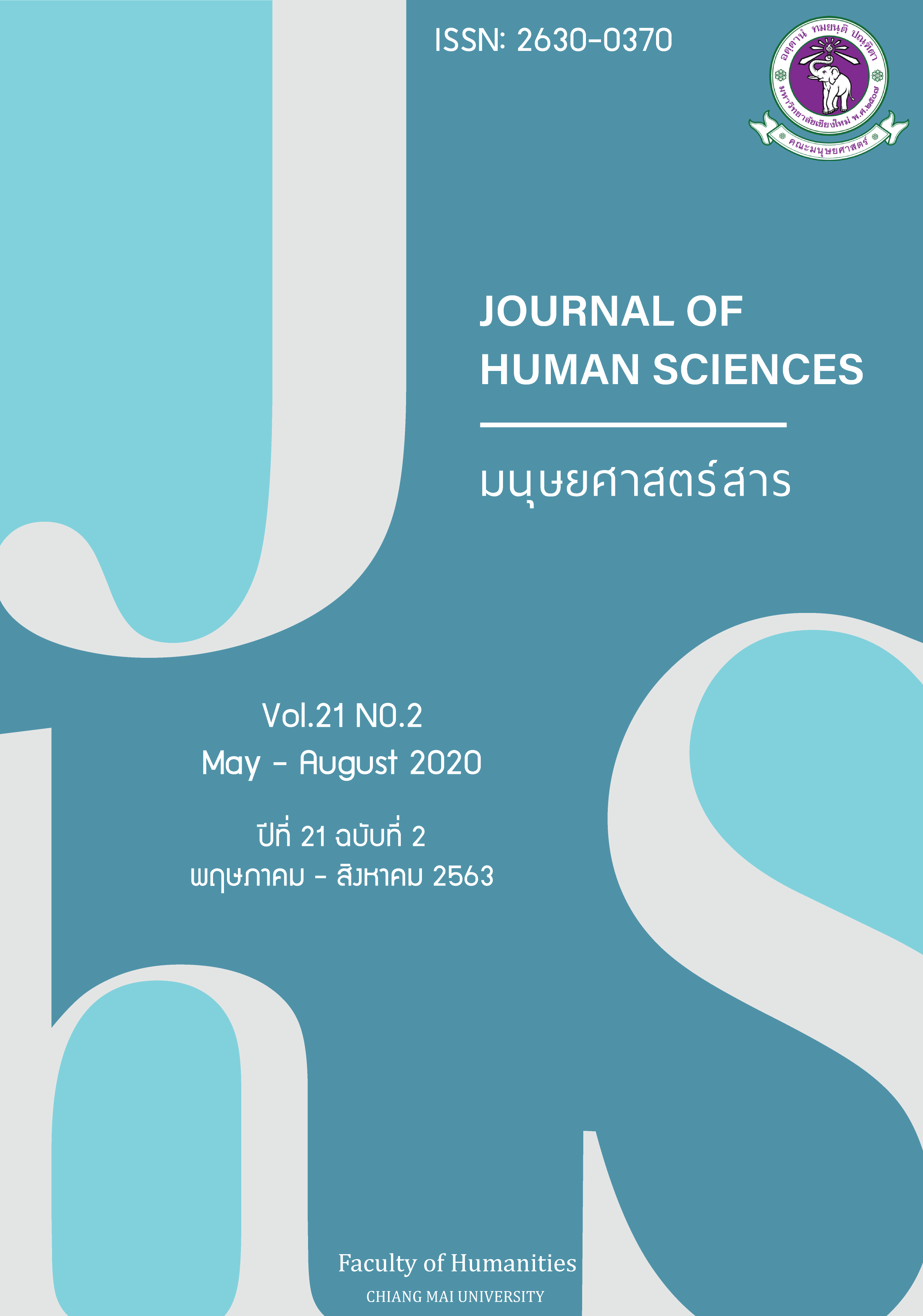การเปลี่ยนแปลงตัวตนของผู้สูงอายุในพื้นที่กึ่งเมืองกึ่งซนบทในจังหวัดเชียงใหม่
Main Article Content
บทคัดย่อ
งานวิจัยนี้มีวัตถุประสงค์เพื่อที่จะทำความเข้าใจและอธิบายถึงเหตุผลของการปรับตัวของผู้สูงอายุที่มีต่อการเปลี่ยนแปลงที่เกิดขึ้นเนื่องมาจากการหวนพัวพันและการเปลี่ยนแปลงตัวตนของผู้สูงอายุที่เกิดขึ้นตามมา โดยใช้ระเบียบวิธีวิจัยเชิงคุณภาพ เก็บข้อมูลโดยการสัมภาษณ์เชิงลึก การมีส่วนร่วม การสังเกตุ และการพูดคุยโดยทั่วไป โดยมีผู้สูงวัยที่จำนวน 13 ท่านเป็นผู้ให้ข้อมูล การวิเคราะห์ข้อมูลได้พิจารณาถึงลักษณะที่เปลี่ยนไปของผู้สูงอายุผ่านแนวคิด การปรากฏออกมา การวิจัยพบว่าในกระแสของกระบวนการการกลายเป็นเมืองที่กำลังดำเนินไปอย่างต่อเนื่องในพื้นที่กึ่งเมืองกึ่งชนบทในจังหวัดเชียงใหม่ผู้สูงอายุที่อาศัยอยู่ในพื้นที่จำต้องมีการปรับตัวเมื่อต้องเผชิญกับการหายไปอย่างรวดเร็วต่อการเกิดขึ้นของความเปลี่ยนแปลงทางสังคมต่างๆซึ่งล้วนแต่มีผลกระทบต่อการดำเนินชีวิตตามปกติของผู้สูงอายุ แต่เดิมทีผู้สูงอายุได้ดำเนินชีวิตตามแบบดั้งเดิมที่สืบทอดกันมาในฐานะผู้สูงอายุที่มีลักษณะเป็นแบบเกษตรกรตามอัธยาศัย ต่อมาการกลายเป็นเมืองได้เข้าสู่พื้นที่ ผู้สูงอายุจึงได้เกิดการหวนพัวพันทางสังคมในความพยายามที่จะปรับตัวเองให้เข้ากับสถานการณ์โดยกลยุทธ์ที่แตกต่างกันออกไปตามโอกาสในอันที่จะดำเนินชีวิตต่อไปตามปกติเช่นเดียวกับสมาชิกอื่นๆในสังคมในพื้นที่ที่กำลังผ่านขบวนการการกลายเป็นเมืองแห่งนี้ ในการดังกล่าวผู้สูงอายุจึงถูกมองว่าผ่านการเปลี่ยนแปลงตัวตนจากเกษตรกรตามอัธยาศัยสู่ผู้สร้างความเชื่อมโยงเชิงรุก
Article Details
เอกสารอ้างอิง
Bunyanuphong, K., & Bunyanuphong, S., (1993). Sakkayaphap khong phusung-ayu naikanthamngan phuea sangkhom. Social Research Institute, Chiang Mai University
DellaCava, F., Phillips, N., & Engel, M. (2004). Adoption in the U.S.: The Emergence of a Social Movement. Journal of Sociology and Social Welfare, 31(4). 141-160.
Goldspink, C., & Kay, R. (2007). Social Emergence: Distinguishing reflexive and non-reflexive modes. The Centre for Research in Social Simulation.
Hermida, A., (2010) Twittering the News. Journalism Practice, 4(3). 297-308.
Kapferer, B., 1976. Introduction: Transactional models reconsidered. In Bruce Kapferer (Eds.), Transaction and Meaning: Directions in the Anthropology of Exchange and Symbolic Behavior. Philadelphia: Institute for the Study of Human Issues.
Kim, J. (2006). Emergence: Core ideas and issues. Synthese, 151. 547–559.
Kranrattanasuit, N., & Sumarlan, Y. (2017). Lessons for prospective elderly in Thailand: Economic insecurity. Journal of Language and Culture, 36(1). 7-24.
National Statistics Office. (2016). The Labor Force Survey Whole Kingdom 2016. Ministry of Information and Communication Technology, Thailand.
Panpeng, C., (2004). Adjustment of the Poor Older Persons in Phetchabun Province. (M.A. Thesis, Mahidol University)
Population Statistics Group. (2017). Social Statistics Division, National Statistical Office Report on The 2017 Survey of The Older Persons in Thailand. Retrieved from http://www.nso.go.th/sites/2014en/
Rigg, J., Phongsiri, M., Promphakping, B., Salamanca, A., & Sripun, M. (2020). Who will tend the farm? Interrogating the ageing Asian farmer. The Journal of Peasant Studies, 47(2). 306-325.
Rojananan, J. (2018). National Responses to Aging Society in Thailand. Retrieved from https://www.kenan-asia.org/wp-content/uploads/2018/11/Ms.-Jinanggoon-Rojananan-National-Responses-to-Aging-Society.pdf
Santasombat, Y. (2008). Flexible Peasants: Reconceptualizing the Third World’s Rural Types. Chiang Mai: Regional Center for Social Science and Sustainable Development (RCSD), Chiang Mai University Press.
Sasiwongsaroj, K., & Burasit, Y. (2019). Managing Thailand’s Ageing Population. ISEAS Perspective, 32. 1-15.
Sawyer, K. (2001). Emergence in Sociology: Contemporary Philosophy of Mind and Some Implications for Sociological Theory. American Journal of Sociology, 107(3). 551-585.
Thailand Development Research Institute (TDRI). (2019). Longevity society: Thailand at a crossroad. Retrieved from https://tdri.or.th/en/2019/05/longevity-society-thailand-at-a-crossroad/
Trosper, L. (2005). Emergence unites ecology and society. Ecology and Society 10(1): 14.
Tubtim, T. (2012). Migration to the Countryside. Critical Asian Studies, 44(1). 113-130.
Tubtim, T. (2014). Rural Crossroads: Class and Migration in Peri-Urban Chiang Mai. (Ph.D. Dissertation, Chiang Mai University).
Department of Economic and Social Affairs. (2017). World Population Prospects: The 2017 Revision. Retrieved from https://population.un.org/wpp/Publications/Files/WPP2017_DataBooklet.pdf
Watson, J. (2013). Emergence and Cosmic Hermeneutics. (Ph.D. Dissertation, Arizona State University).
Weiangkham, D., Kerdmongkol, P., Amnatsatsue, K., Sasat, S., & Steckler, A. B. (2014). Problems and Needs of the Elderly in Northern Thailand Remote Area. Kasetsart J. (Soc. Sci.), 35. 516-523.
Yuji, B. (2006). Changing Meaning of the Elderly in Nan Province, Northern Thailand: From “Khon Thao Khon Kae” to “Phu Sung Ayu.”. Southeast Asian Studies, 44(3).


